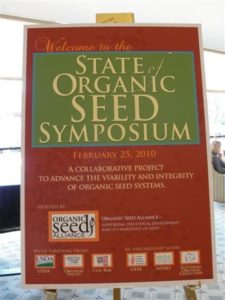
Over the years, OSA has established itself as a leader in promoting the benefits of organic seed systems. We believe that organic agriculture holds the potential for new models of decentralized systems that serve community needs. We also believe that organic food integrity begins with organic seed integrity, and recognize that threats to this integrity must be confronted. As such, OSA’s advocacy program has become increasingly active in efforts to both promote the benefits of organic seed and protect organic seed from major risks, including contamination by genetically engineered (GE) crops, seed industry consolidation, and restrictive intellectual property protections.
Our advocacy work in 2010 focused a great deal on our State of Organic Seed (SOS) project. In February we hosted the SOS symposium, where more than 100 participants ranging from farmers, certifiers, regulators, university researchers, seed and food company representatives, and non-government organizations convened to assess challenges and successes in organic seed systems. Next month, we’ll release the State of Organic Seed report, the first comprehensive analysis of these issues that draws on over 1,000 organic farmer surveys as well as symposium discussion.
Among the report’s recommendations: It is time for a broader coalition of organic stakeholders to address the barriers and opportunities in moving organic seed forward.
To this end, OSA is poised to launch working groups in 2011 that focus on four key issues: Organic Plant Breeding, Concentration, Contamination, and Intellectual Property. Each working group will include diverse stakeholders charged with developing strategies for action items identified in the SOS report. The purpose of each is to reach both short-term objectives and make long-term transformative change.
These working groups couldn’t be timelier. The landscape of seed advocacy changed considerably in 2010. You may have read about the shift in many farmers’ attitudes toward GE crops (and investors’ attitudes toward biotech firms) which not only validates the organic community’s work that calls into question the environmental and economic benefits of GE crops, but also creates opportunities to showcase working models and solutions that provide farmers the seed they need. These models include building organic seed systems through participatory plant breeding work, like our involvement in the Northern Organic Vegetable Improvement Collaborative (NOVIC) – a project that restores the regional role of farmers and public breeders in crop improvement.
The issues of organic integrity and GE contamination continue to receive unprecedented attention thanks to court decisions involving GE sugar beets and alfalfa. OSA, with the help of the Center for Food Safety, enjoyed a big victory in August when Jeffrey White, federal district judge for the Northern District of California, vacated USDA’s approval of Roundup Ready (RR) sugar beets pending a full Environmental Impact Statement (EIS). This means RR sugar beets are again a regulated crop and illegal to plant commercially. Yet, within weeks of this ruling, USDA permitted the planting of GE sugar beets (planted with the intent for future seed production). OSA joined a second lawsuit in September challenging these plantings, and in November, Judge White ordered the crops be destroyed. These legal victories call on our regulatory agencies to honor organic integrity.
As we celebrate successes – with organic integrity in the courtroom or cold-tolerance in the field – let’s set our sights on something bigger at stake: seed as a public resource.
Earlier this year OSA participated in an historic workshop in Iowa hosted by the U.S. Departments of Justice and Agriculture. The workshop focused on competition concerns in agriculture, and our staff provided compelling testimony on how seed industry concentration is negatively impacting the organic sector. Among other issues, OSA pointed to the current intellectual property regime (i.e., utility patents on plants) that is facilitating consolidation, eroding farmers’ rights, and privatizing genetics and public research. After this workshop, OSA submitted public comments to these departments that served as an in-depth rebuttal to the industry leader’s comments. Thirty-eight leading food and seed companies along with nonprofits and farm associations endorsed these comments. OSA board member Fred Kirschenmann called them “a masterpiece.”
A shift in policy and mindset that reflects the ethical stewardship of seed as a resource – and does not include patenting our seed heritage – will ensure future generations have the tools and resources they need to protect and improve seed in the face of their own changing landscapes.
It’s an exciting time to be an advocate for seed stewardship. The future is always uncertain but one thing is not: We can create meaningful change – be it removing utility patents on plant genetics, protecting organic seed from GE contamination, or restoring farmers’ rights – with your help. Stay engaged in our advocacy efforts by joining our quarterly newsletter, bookmarking our blog, Seed Broadcast, following us on Facebook and Twitter, and contacting me with your personal stories and ideas.
